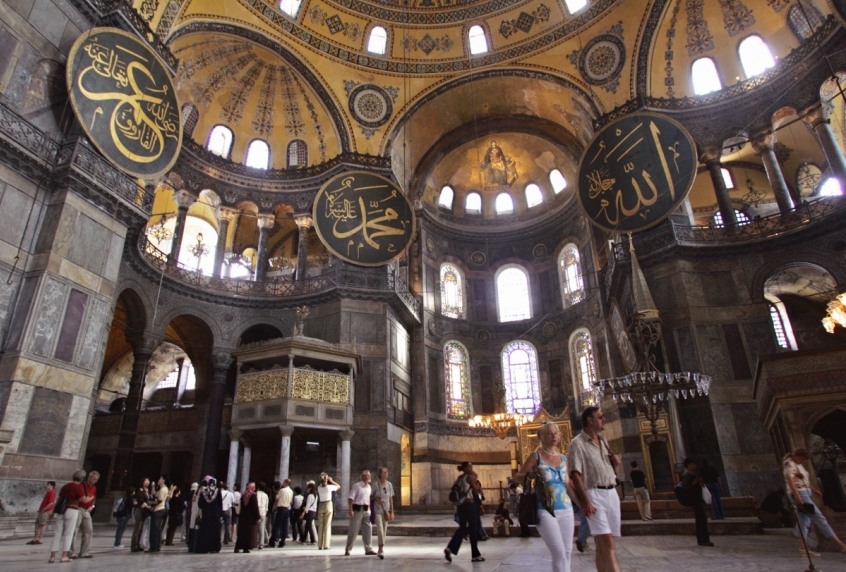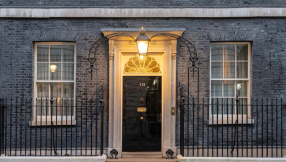
"We currently stand next to the Hagia Sophia mosque," so said Turkey's deputy prime minister, Bulent Arinc last month during a dedication of a museum of Caucasus rugs and carpets next to the Istanbul landmark, according to the Religion News Service (RNS).
This speech was one in a line of recent statements, from offhand remarks to outright demands that the Hagia Sophia (also known as the "Church of Saint Wisdom" or "Divine Wisdom") be converted from a museum and local attraction back into a mosque.
"We are looking at a sad Hagia Sophia but hopefully we will see it smiling again soon," Arinc added.
One of the imams of the nearby Sultan Ahmet Mosque (locally known as the 'Blue Mosque') also reportedly preached a sermon that said its conversion must take place.
Although this has been an ongoing concern for many years, recent events have brought the issue into sharper focus. A campaign from the National Turkish Student Association has been targeting the issue aggressively in recent months. Also, there have been a number of successful recent attempts to convert former Byzantine churches into mosques. Arinc, in his speech, mentioned two churches that had recently been converted, one in Trabzon in the northeast and another in Iznik near Istanbul.
The most notable case of this however has yet to be completed, the Monastery of Stoudios, the largest Byzantine church in Istanbul, which will be converted into a mosque next year.
Engin Akyurek, a professor of Byzantine art at Istanbul University, has said in an RNS article this would be a disastrous loss to history.
"To use this building for some function, a mosque or anything else, would mean to reconstruct almost 80% of the building … it will not be a fifth-century building anymore. It will be a catastrophe for that building."
Some have pointed out that the belief that the Hagia Sofia should become a mosque again is linked to a Sharia law principle that if a building is ever used as a mosque, it can then never be used for any other alternative purpose again.
A historic example of this was seen during the siege of Jerusalem in 637 AD. After the siege, Caliph Omar travelled to Jerusalem because Patriarch Sophronius had demanded that he would only surrender to the Caliph in person. Once the surrender was agreed, the Caliph was shown around the city by the Patriarch. When they visited the Church of the Holy Sepulchre, the Patriarch offered the Caliph a portion of the Church to pray in. The Caliph refused, explaining "Had I prayed inside the church, the Muslims coming after me would take possession of it, saying that I had prayed in it."
International reaction to the potential conversion of the Hagia Sofia has been decidedly negative. Quoted by the RNS, in responding to Mr Arinc's speech, the Greek Foreign Ministry called the action "an insult to the religious sensibilities of millions of Christians and actions that are anachronistic and incomprehensible from a state that declares it wants to participate as a full member in the European Union".
Ecumenical Patriarch Bartholomew, Archbishop of Constantinople, talking to Turkish newspaper Milliyet in February, said that "If it is to reopen as a house of worship, then it should open as a Christian church… It was built as a church and not a mosque."
The Hagia Sophia has been standing since 360 AD, built after the Roman Emperor Constantine converted to Christianity and moved the capital eastwards. There is a legend that once the Church was finally completed in 597, and the Emperor Justinian made his first visit inside, he supposedly exclaimed 'Solomon, I have surpassed thee'."
It was over 850 years later, in 1453, that the Ottomon Turks seized Constantinople, taking possession of the magnificently domed building and repurposing it into a mosque, which it would remain as for almost 500 years. Then in 1935, under the secular Turkish Republic founded by Kemal Mustafa Ataturk, the government turned the Hagia Sophia into a museum, thereby sidestepping difficult sectarian conflict between the Islamic majority and the Christian minority.
Political analysts point out that with provincial elections on the horizon in March 2014, many conservative candidates from the Islamist-leaning Justice and Development party see converting former Byzantine churches as a means of energising and shoring up the religious base of their party. This is particularly necessary after widespread challenges to other parts of their agenda, such as increased restrictions on the sale of alcohol.
But many argue that while this strategy might work, it also has the potential to antagonise other religious groups and will definitely leave Turkey's historical heritage significantly damaged.
"Supporting the reopening of Hagia Sophia has become the litmus test of the true believer," said Professor Robert Ousterhout, the director of the Centre for Ancient Studies at the University of Pennsylvania to the RNS. "Protests by the academic community have fallen on deaf ears."













